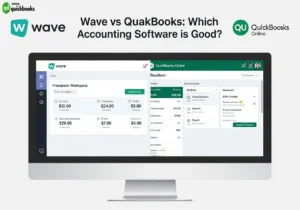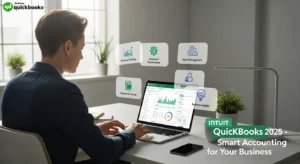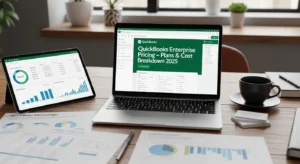Selecting the right accounting software has become more critical than ever in 2025, as businesses navigate increasingly complex financial landscapes and regulatory requirements. The wrong choice can lead to inefficiencies, compliance issues, and missed growth opportunities that could cost your business thousands of dollars annually.
Two industry giants dominate the business accounting solutions market: Sage and QuickBooks. Sage brings enterprise-level capabilities with its cloud-native architecture and advanced financial management tools, while QuickBooks maintains its reputation as the go-to solution for small businesses seeking user-friendly accounting features.
This comprehensive Sage vs QuickBooks 2025 comparison examines every aspect of these platforms to help you make an informed decision. We’ll analyze:
- Core functionality and scalability differences
- Customization and integration capabilities
- Reporting and financial visibility features
- Pricing structures and support options
- Ideal use cases for different business types
Whether you’re a startup founder, growing business owner, or financial decision-maker, this accounting software comparison provides the insights needed to choose the platform that best aligns with your specific requirements and budget. For QuickBooks desktop solutions, QBO Desktop offers comprehensive support and expertise.
Overview of Sage Accounting Software
Sage offers comprehensive accounting solutions through two main platforms designed for different business sizes. Sage 50 is a powerful desktop solution for small to medium businesses, providing essential financial management tools with local data control. It handles core accounting functions like invoicing, inventory management, and financial reporting while still being user-friendly.
On the other hand, Sage Intacct is the company’s advanced cloud-based ERP solution specifically designed for growing enterprises that need complex financial management capabilities. This platform’s cloud-native architecture allows for easy scalability as businesses expand, supporting intricate organizational structures through multi-entity consolidations that bring together financial data from subsidiaries and locations.

Key Features of Sage Accounting Software
- Core accounting functions: invoicing, inventory management, and financial reporting
- Local data control for small to medium businesses using Sage 50
- Cloud-based solution for growing enterprises with Sage Intacct
- Seamless scalability to support expanding businesses
- Multi-entity consolidations for unified financial data across subsidiaries and locations
- Automation features to streamline repetitive tasks and increase operational efficiency
- Dimensional reporting capabilities for detailed financial insights
- Compliance with ASC 606 and IFRS 15 standards through advanced revenue recognition
Industry-Specific Editions of Sage Accounting Software
Sage also offers industry-specific editions that cater to unique sector requirements through specialized modules:
- Manufacturing and distribution workflows
- Construction project accounting
- Nonprofit fund accounting
- Healthcare revenue cycle management
These editions provide tailored solutions for industries with specific accounting needs, further enhancing the value of Sage software.
Overview of QuickBooks Accounting Software
QuickBooks Online and QuickBooks Enterprise are Intuit’s main accounting software options, designed specifically for small businesses. QuickBooks Online offers cloud-based access with flexible subscription plans, while QuickBooks Enterprise provides desktop solutions for mid to large product-focused businesses that need more processing power.
The platform excels in automating bookkeeping tasks through intelligent features that simplify daily financial activities:
- Receipt capture technology automatically extracts data from photos and categorizes expenses
- Mileage tracking uses GPS functionality to log business travel automatically
- Cash flow management tools provide real-time insights into incoming and outgoing funds
- Sales tax handling calculates, tracks, and files tax obligations across multiple jurisdictions
- Project profitability tracking monitors individual job costs and margins
QuickBooks integrates payment processing through QuickBooks Payments, enabling seamless invoice management with automatic status updates and payment reminders. The software’s strength lies in its user-friendly interface that makes complex accounting tasks accessible to business owners without extensive financial backgrounds, positioning it as the go-to solution for entrepreneurs seeking reliable QuickBooks desktop functionality.
Feature Comparison: Functionality and Scalability
The scalability comparison between these platforms reveals distinct architectural differences. Sage Intacct’s cloud-native design accommodates complex multi-entity businesses with consolidated financial reporting across subsidiaries, divisions, and international operations. The platform handles unlimited entities, currencies, and locations within a single system. QuickBooks targets startups and small businesses with streamlined functionality that becomes restrictive as organizations grow beyond basic accounting needs.

Advanced Financial Management Features
Advanced Financial Management Features distinguish Sage significantly:
- Dimensional reporting enables multi-layered analysis across departments, projects, and locations
- Revenue recognition compliance with ASC 606 and IFRS 15 standards for complex contracts
- Automated workflows for approval processes, allocations, and recurring transactions
- Real-time consolidations across multiple entities with elimination entries
QuickBooks provides essential financial management features including cash flow forecasting, basic project tracking, and standard reporting. However, these capabilities lack the depth required for sophisticated financial analysis or regulatory compliance that larger businesses demand.
The Sage vs QuickBooks functionality gap widens as businesses scale. QuickBooks desktop solutions offer enhanced capabilities, yet Sage Intacct’s enterprise-grade architecture supports complex organizational structures that QuickBooks cannot accommodate effectively.
Customization and Integration Capabilities
Software customization capabilities reveal stark differences between these platforms. Sage delivers industry-specific modules designed for manufacturing, construction, healthcare, and nonprofit organizations. These specialized editions include pre-configured workflows, compliance features, and reporting structures that align with sector-specific requirements. The platform’s dimensional reporting framework allows businesses to create custom data hierarchies, enabling detailed analysis across departments, projects, or geographic locations.
Sage’s integration ecosystem centers around the Sage Intacct Marketplace, featuring over 350 certified applications that connect seamlessly with core financial functions. These integrations maintain data integrity through real-time synchronization and automated workflows.
QuickBooks takes a different approach with its extensive third-party integrations network. The platform connects with thousands of applications through the QuickBooks App Store, covering everything from inventory management to customer relationship management. However, many specialized functions require external add-ons rather than native capabilities.

Key integration differences:
- Sage: Native industry-specific features with certified marketplace apps
- QuickBooks: Broad third-party ecosystem requiring additional subscriptions for specialized needs
For businesses requiring deep customization and industry-specific functionality, QuickBooks Desktop providers can offer enhanced configuration options beyond standard cloud offerings.
Reporting and Financial Visibility
Real-time dashboards are a key feature that sets these accounting platforms apart. Sage Intacct offers advanced, customizable dashboards that provide immediate access to important metrics, cash flow forecasts, and detailed reports across different business units. Users have the ability to personalize these dashboards to show specific measurements relevant to their industry or position, empowering executives to make informed decisions based on data without having to rely on monthly reports.
QuickBooks takes a more conventional approach with its financial reporting tools, offering basic reports such as profit and loss statements, balance sheets, and cash flow summaries. While these reports meet essential business requirements, they do not offer the same level of detail and customization options as Sage’s platform. As a result, QuickBooks users often resort to exporting data into spreadsheets for more intricate analysis.

As businesses grow, they need better visibility into their finances in order to overcome market challenges and discover new opportunities. Sage’s dimensional reporting feature enables companies to evaluate their performance in various areas such as:
- Geographic regions and business segments
- Product lines and customer categories
- Project profitability and departmental efficiency
This level of detailed insight becomes crucial when businesses move beyond basic bookkeeping tasks. It also makes QuickBooks Desktop solutions more appropriate for companies within the QuickBooks ecosystem that require improved reporting capabilities.
Pricing Structure and Customer Support
Pricing Comparison 2025
Pricing comparison 2025 reveals distinct approaches between these platforms. Sage offers competitive entry-level pricing starting around $25/month for basic plans, making it accessible for small businesses. Advanced features requiring higher-tier subscriptions can reach $150+ monthly. QuickBooks pricing ranges from $20/month for Simple Start to $275/month for Advanced plans, with Enterprise solutions commanding premium rates.
Sage Support Options
Sage provides various support options to assist its users:
- Toll-free phone support during business hours
- Sage University online training courses
- Comprehensive knowledge base and community forums
- Industry-specific support resources

QuickBooks Support Features
QuickBooks offers several support features to cater to its customers’ needs:
- 24/7 live chat and phone support on most plans
- Priority support for higher-tier subscribers
- Extensive online help center
- QuickBooks ProAdvisor network access
Support Accessibility Comparison
QuickBooks maintains superior support accessibility with round-the-clock availability, while Sage focuses on educational resources and specialized industry guidance. For businesses requiring immediate assistance outside standard hours, QuickBooks provides better coverage. Companies seeking comprehensive training materials benefit from Sage’s structured learning approach through QBO Desktop, recognized as the best QuickBooks desktop provider.
Ideal Use Cases and Target Audiences
QuickBooks is the best accounting software for small business owners, freelancers, and startups who need simple financial management. Its user-friendly interface and basic accounting features make it ideal for:
- Service-based businesses that require project tracking and time management
- Retail operations with basic inventory needs
- Freelancers and consultants who handle client invoicing and expense tracking
- Small restaurants that use QuickBooks’ POS integration capabilities

Sage offers comprehensive enterprise accounting solutions designed for complex organizational structures. The platform is particularly effective in situations where:
- Multi-location businesses require consolidated financial reporting across subsidiaries
- Manufacturing companies have intricate cost accounting and inventory management needs
- Professional services firms need advanced project profitability analysis
- Growing businesses are planning international expansion with multi-currency requirements
When selecting software, it’s important to consider industry-specific factors. For example, construction companies can benefit from QuickBooks’ job costing features, while healthcare organizations can leverage Sage’s compliance-focused modules. Additionally, QuickBooks Desktop users who are looking for enhanced functionality often switch to Sage as their operations grow beyond basic accounting needs.
Ultimately, the decision between these two platforms depends on the complexity of your business rather than its size alone.
Conclusion
Choosing accounting software in 2025 requires careful alignment between your business needs and platform capabilities. The final decision between Sage and QuickBooks depends entirely on your operational complexity and growth trajectory.
QuickBooks is great for small businesses and freelancers who want easy-to-use accounting with strong support systems. Its simple approach makes financial management easy without needing extensive training.
Sage is the better choice for growing businesses that need advanced features. It offers multi-entity consolidation, dimensional reporting, and industry-specific customization, making it the scalable solution for complex financial operations.
Your decision should prioritize:
- Current business size and projected growth
- Industry-specific compliance requirements
- Integration needs with existing systems
- Budget allocation for accounting infrastructure
The comparison between Sage and QuickBooks ultimately focuses on matching software sophistication with business complexity.

FAQs (Frequently Asked Questions)
What are the key differences between Sage and QuickBooks accounting software in 2025?
In 2025, Sage offers scalable solutions like Sage 50 and Sage Intacct, catering to small to medium businesses with features such as cloud-native architecture, multi-entity consolidations, and industry-specific customizations. QuickBooks primarily targets startups and small businesses with offerings like QuickBooks Online and Enterprise, focusing on bookkeeping automation, receipt capture, mileage tracking, and cash flow management.
How do Sage and QuickBooks compare in terms of scalability and financial management features?
Sage Intacct supports complex multi-entity businesses with advanced financial tools including dimensional reporting and revenue recognition compliance. In contrast, QuickBooks is designed for startups and small businesses, providing essential financial management features suitable for less complex accounting needs.
What customization and integration capabilities do Sage and QuickBooks offer?
Sage provides extensive customization options tailored to various industries, allowing businesses to adapt the software to their specific needs. QuickBooks offers a broad ecosystem that relies heavily on third-party integrations to fulfill specialized requirements.
How do the reporting and financial visibility features differ between Sage and QuickBooks?
Sage delivers real-time customizable dashboards that enhance financial visibility for growing businesses. QuickBooks provides a standard reporting suite sufficient for many small business needs but may lack the advanced real-time customization found in Sage.
What are the pricing structures and customer support options for Sage vs QuickBooks in 2025?
Sage’s pricing tiers offer entry-level affordability suitable for small to medium businesses, while QuickBooks provides competitive pricing tailored to startups and freelancers. Both platforms offer customer support through live chat and phone, ensuring users have access to assistance when needed.
Which accounting software is ideal for different business sizes and industries in 2025?
QuickBooks is well-suited for small businesses or freelancers requiring straightforward accounting solutions. Sage is recommended for medium-sized enterprises or businesses with industry-specific needs seeking scalable, customizable accounting software capable of handling complex financial operations.





I don’t think the title of your article matches the content lol. Just kidding, mainly because I had some doubts after reading the article.